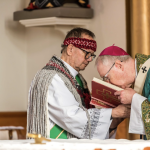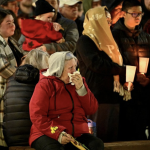VANCOUVER (CCN) — Tributes for Pope Emeritus Benedict XVI have poured in from leaders of the Canadian Catholic community following the former Pontiff’s passing on Dec. 31 at his residence at the Vatican’s Mater Ecclesiae Monastery.
Vancouver Archbishop Michael Miller commended Pope Emeritus Benedict XVI as an intellectual giant and great evangelizer.
Benedict XVI’s funeral Mass will take place at St. Peter’s Thursday, Jan. 5, at 12.30 a.m. PST.
“The death of Pope Emeritus Benedict XVI is an occasion that causes us both sadness for our loss and gratitude for his ministry,” wrote Archbishop Miller. “Although the Church and the world have lost one of the finest Christian minds of modern times, his passing invites reflection on his dedicated service to the Gospel.
“The former Pope’s writings, known for their clarity and depth, form a legacy that will endure through the ages. History will remember his bold decision to resign from the papacy when he felt himself unable to fulfill the demands of the office,” Archbishop Miller noted.
“As a close collaborator of Pope St. John Paul II, he contributed greatly to a life-giving implementation of the Second Vatican Council and fostering the new evangelization for our times.”
Archbishop Miller ended his tribute on a personal note, expressing admiration for “Pope Benedict’s kind manner and his organizational skills whenever we met,” and for the late Pope’s appointment of Miller as Archbishop of Vancouver in 2009.
The Canadian Conference of Catholic Bishops said Pope Benedict served “as a faithful and sure guide of Catholic doctrine” in his various offices with the Holy See and at the same time “challenged us ‘to dare to love.’”
The bishops’ statement said, “As Canadians, we are especially grateful for his efforts to heal the wounds of our past,” noting Benedict’s meeting with victims of abuse by members of the clergy.
“Pope Benedict XVI also invited a Canadian delegation, made up of representatives of Indigenous communities, as well as Catholic dioceses and religious communities across Canada, to a private meeting in April 2009 to discuss their experience of residential schools. During this meeting, the Pope listened to their stories and expressed his regret and sadness for the sorrow suffered by many Indigenous people in the residential school system.”
He also canonized North America’s first Indigenous saint, St. Kateri Tekakwitha, also known as the “Lily of the Mohawks,” said the CCCB.
Cardinal Thomas Collins, the Archbishop of Toronto, hailed the former Pope as a model of inspiring discipleship and theological wisdom.
“Throughout the Archdiocese of Toronto, we join in mourning the loss of Pope Emeritus Benedict XVI,” wrote Cardinal Collins. “We give thanks for his years of faithful, thoughtful and inspiring service to the Church. As a priest for more than 70 years and in his time as bishop and supreme Pontiff, Pope Emeritus Benedict XVI offered each one of us a personal example of fidelity and of what it is to be a devoted disciple of Jesus.
“As a theologian, he followed in the footsteps of the great St. Augustine, in offering to us profound insight into the mysteries of our Christian faith, insight arising by God’s grace not only from his astonishing intellect and learning but also from his personal holiness and pastoral care for God’s people; his writings will help guide disciples of Jesus in the centuries that lie before us.”
Cardinal Collins also lauded Pope Emeritus Benedict XVI’s leadership of the universal Church.
“As Pope, he led the universal Church with wisdom and holiness, providing a clear and loving message of how our faith can inspire us and guide us through the storms of life’s journey. More than ever, his own witness, humility, and invitation to put others before ourselves should resonate throughout the world,” the cardinal observed.
“We pray for the repose of his soul. Eternal rest grant unto him, O Lord, and may perpetual light shine upon him. May he rest in peace.”
Cardinal Collins has asked all 225 member parishes of the Toronto archdiocese to add a special prayer of the faithful at all Masses until Pope Emeritus Benedict XVI’s funeral, which is set for the morning of Jan. 5 at St. Peter’s Basilica. The intention reads as follows: “For the repose of the soul of Pope Emeritus Benedict XVI, and in thanksgiving for a life of faithful and humble service. We pray to the Lord.”
Member parishes are also asked to lower their papal flags until the conclusion of the former pontiff’s funeral and to celebrate a special Mass for him at some point before the celebration of life at the Vatican.
In Edmonton, Archbishop Richard W. Smith offered “profound thanks to God for the gift that this humble servant of the Lord has been to the Church and world. Following his episcopal motto, cooperatores veritatis, Pope Emeritus Benedict XVI dedicated his life to living in and serving the truth, who is a person: Jesus Christ.”
Archbishop Smith said Pope Emeritus Benedict XVI was “a model disciple and gifted teacher” who left as his legacy “both a personal example of loving fidelity to the Lord and a corpus of writings that offers sure guidance for Christian living.”
Canada’s Catholic Civil Rights League called Pope Emeritus Benedict XVI “a major theologian and a great teacher.”
Pope Emeritus Benedict XVI writings “bear witness to his special gifts,” said the league, noting “numerous references in his words where he brought Christ and the theology of the Church to the public square, against the onslaught of efforts to remove positions of faith from public engagement.”
The league noted two occasions in particular in which it was inspired in its mission and mandate by the late Pope.
The first was his homily at the opening Mass of the papal conclave on April 18, 2005, which would conclude with him being elected the 265th Pope. In his remarks, Pope Emeritus Benedict XVI identified the “dictatorship of relativism” with which the world was struggling.
The other occasion came five years later, at Westminster Hall, addressing representatives of British society, including the diplomatic corps, politicians, academics, and business leaders. “Benedict spoke of the necessity for the complementary roles of religion and politics in a mature democracy,” the league noted.
The league said it was blessed and “incredibly grateful to have had the guidance from Pope Benedict XVI to assist and sustain us with the fullness of Catholic teachings in matters of public importance in Canada and the world.”
Pope Benedict’s death was announced in Rome on Dec. 31.
“With sorrow I inform you that the Pope Emeritus, Benedict XVI, passed away today at 9:34 a.m. in the Mater Ecclesiae Monastery in the Vatican,” Vatican press office director Matteo Bruni said.
The funeral Mass will take place at St. Peter’s Thursday, Jan. 5, at 12.30 a.m. PST.
Born Joseph Aloisius Ratzinger, he was elected to the papacy in April 2005, taking the name Benedict XVI, after decades of service to the Catholic Church as a theologian, prefect for the Congregation for the Doctrine of the Faith, cardinal, and one of the closest collaborators of St. John Paul II, whom he succeeded as Pope.
On Feb. 11, 2013, the 85-year-old Benedict shocked the world with a Latin-language announcement of his retirement, becoming the first Pope in 600 years to do so. He cited his advanced age and his lack of strength as unsuitable to the exercise of his office.
Widely recognized as one of the Catholic Church’s top theologians, Benedict’s pontificate was marked by a profound understanding of the challenges to the Church in the face of growing ideological aggression, not least from an increasingly secular Western mindset, both within and outside the Church. He famously warned about the “dictatorship of relativism” in a homily just before the conclave in 2005 that elected him Pope.
Born in a small village in Bavaria called Marktl am Inn on April 16, 1927, the future Pope grew up in a region of Germany long known as a stronghold of Marian devotion and piety. He was the third and youngest child of Joseph and Maria Ratzinger.
His youth in the nearby Bavarian town of Traunstein was overshadowed by the rise of the Nazi party, a regime he called “sinister” and that “banished God and thus became impervious to anything true and good.”
After a brief forced conscription of two months into the German army at the end of the Second World War, Ratzinger and his older brother, Georg, resumed their studies for the priesthood, first in Freising and then in Munich.
Ordained a priest with his brother on June 29, 1951, Ratzinger finished his doctoral studies in theology and became a university teacher and vice president at the prestigious University of Regensburg in Bavaria. His reputation as an intellectual prompted an invitation to serve as an expert, or peritus, at the Second Vatican Council from Cardinal Joseph Frings, the archbishop of Cologne. He rapidly distinguished himself as an eminent theologian.
In 1977, Pope Paul VI named him archbishop of Munich and Freising and, later that same year, gave him the cardinal’s red hat.
Just four years later, in 1981, Pope John Paul II appointed Ratzinger as prefect of the Congregation for the Doctrine of the Faith, the department of the Vatican dedicated to promoting and defending the teachings of the Catholic faith. He held the post until the death of John Paul II in 2005.
After his retirement in 2013, the Pope emeritus resided in the Mater Ecclesiae Monastery, a small convent built in 1994 inside the Vatican City walls, dedicating himself to a life of penance and prayer.
Statement from CCCB
Today, the Bishops of Canada join the People of God and Pope Francis in mourning the loss of Pope Emeritus Benedict XVI and thank God for his life of humble and dedicated service. Benedict XVI leaves behind a great legacy of teaching that will continue to inspire us, both through the three encyclicals he wrote and through the many public speeches he delivered throughout the world as Supreme Pontiff. Pope Benedict XVI, “Cardinal Ratzinger,” served as a faithful and sure guide of Catholic doctrine in his various offices with the Holy See.
As Pope, he challenged us “to dare to love” – to make “your whole existence a joyful enterprise of giving yourselves to God and to your brothers and sisters, in imitation of the One who conquered hatred and death forever with love (cf. Rev 5:13)”, and to find peace. comfort and inspiration in the love that Christ has for each one of us.
As Canadians, we are especially grateful for his efforts to heal the wounds of our past. Benedict XVI was the first Pope to meet victims of abuse by members of the clergy. He publicly acknowledged the scourge of abuse by these clergy, apologized for it, and strengthened Church processes to respond to allegations, including facilitating the prosecution or suspension from the clerical state those found responsible for abuse.
Pope Benedict XVI also invited a Canadian delegation, made up of representatives of Indigenous communities, as well as Catholic dioceses and religious communities across Canada, to a private meeting in April 2009 to discuss their experience of residential schools. During this meeting, the Pope listened to their stories and expressed his regret and sadness for the sorrow suffered by many Indigenous people in the residential school system.
A few years later, he canonized North America’s first Indigenous saint, St. Kateri Tekakwitha, also known as the “Lily of the Mohawks.”
As we pray for the eternal rest of his soul, we pray that the love and hope that Pope Emeritus Benedict XVI found in the Risen Lord may continue to inspire and comfort us in the trials and tribulations of our own earthly lives. May peace be granted to him as he rests forever in communion with the Father, the Son and the Holy Spirit.



